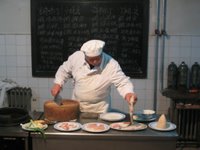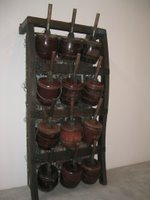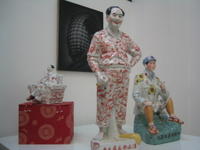Was supposed to meet fellow students for dinner but instead spent last night dealing with a psycho leasing agent and his partner. Had the gracious help of the office and office staff. And the police were great.
I had thought the whole thing was over after the last crazy visit, but at 7 pm, agent Li called again. I explained that he needed to call my colleagues, in part because my Chinese isn't good enough but also because the office is handling my rent. He claimed not to have the number. I insisted he had it and told him I watched my "tong shi" give him the Washington Post number last time. I hung up, called the office and asked them to call Li. Two minutes later, Li was outside my apartment door, again.
The last time he was here, Li came by three times in one evening. The third time he brought three of his partners or bosses. They shouted, demanded money, tried to push their way into my apartment, banged repeatedly on my door and switched off my electricity. After that, we called the police, who said that if the agents ever came back, we should call building security or the police and they would come and tell them off.
Li did call again, saying he was downstairs. Cops didn't come because he wasn't at my door. This time he was, knocking and phoning at the same time. I called security, who were supposed to keep Li off my floor. They didn't understand me at first. I told them if they didn't call police, I would.
Security came up and talked to Li but he refused to leave. He continued to knock until one of guards stood with his back to my peephole. Li stood aside, trying to call his boss. Meanwhile, Phil called the police, then came over himself. Soon there were two cops, two security agents, the head of security, the Washington Post bureau chief and agent Li, a small party on my doorstep.
The female cop seemed to be in charge. She asked Li where he was from, then said, "This is Beijing. You can't just knock on people's doors demanding money. Are you from the north?"
Then Phil and I and agent Li all climbed into a police car, which sped off to the local station with its lights on, no siren. Li, clearly uncomfortable, wanted to make another call but the cops told him to get in the car. We were at the station for two hours. The desk officer had no discernable facial expression. I didn't realize that he was one of the police officers who had come to my apartment before, shortly after Li's first first visit. It turned out his surname was the same as mine. And he was on our side.
He spoke to us privately, then spoke separately to agent Li and his belligerent boss. The boss told other bystanders in the police station that he was being cheated by a foreigner, who expected special treatment. When I said “ta shuo cuo le,” (he's incorrect), he called me a bitch and accused me of lying about my lack of Chinese.
Later, one of the Post's senior researcher arrived to help translate. I asked Li's boss if he had a sister, a daughter, a mother, and whether he expected them to be treated the same way, harassed and stalked for money. Foreigner, my ass, I said loudly. The researcher translated that too or something very close to it.
We had no contract, no agreement with agent Li or his company. We didn't know that a second agent would show us the same apartment, at a better price. We hadn't deliberately gone around them. We repeatededly said they should call or visit the bureau to resolve any dispute. Or hire a lawyer. We'd be happy to meet them in court (renters don't generally pay the agent's fee. Li demanded more than twice the fee my landlady paid the second agent).
But they preferred to bang on my door, and said so. They told the police that they would continue to come see me because they knew where I lived, and because I was in "their" apartment.
Suddenly, after the desk officer spoke to Li and his boss, they promised to stop harassing me ("sao rao" in Mandarin). I'd love to know what the police actually said. Li's boss promised they wouldn't call, visit or even go to the bureau. I said they were welcome to come to our office, but they said they wouldn't waste another minute on this. It's finished, closed, they said, walking out of the police station in a huff.
On the one hand, they really lost face and I wondered whether it's really over. On the other hand, another observer said, they knew they were wrong. That's why they didn't want to pursue it legally. So it's over.
Getting around by bike is great. I now park it in my apartment. I'm not the only one: each morning all the mountain bikes in the building come down by elevator.
Crossing guards here are armed with whistles, red flags, bullhorns and a sharp sense of limit lines. They scold and shout at cyclists who nudge just so slightly over the white line, waiting impatiently for the light to change. In some things there is such order here, in others absolutely none.
My routine for now means rising about 7:30 and starting for class at 8:30. After three hours of drills, reading comprehension and pronounciation practice from three different teachers, I am ready for lunch. Most days that means a $5 bowl of rice and meat at a Japanese restaurant next door, where the waitresses are slowly teaching me the whole menu. The other customers are either Japanese or Chinese businessmen or other foreign visitors or students. Then it's back for two more hours of character class. The teachers dictate and I write words – and now, whole sentences – on a white board. The other students are embassy staff, graduate students, lawyers, businessmen, American, Norwegian, Japanese, Spanish and Dutch.
Then it's home for several hours of homework. Sometimes I stop at the Post Office ("xinfeng" for envelope) or the grocery store ("yan" for salt and "tang" for sugar; they're sometimes both in unmarked clear plastic bags) or today the visa office ("wei shenme" for why, as in, why is my year-long multiple-entry visa now cancelled?).
I also stopped for a gelato and did my homework outdoors watching workers dig up the road with jackhammers. Everywhere you look they're tearing down hutongs or simple two-story brick apartments to make way for gleaming high-rises or hotel, office and shopping complexes. At the next table was another foreigner speaking fluent and rapid Mandarin to two Chinese friends. I could make out that they were talking about the quality of coffee Americans are used to drinking at home (were they planning to open a restaurant?). Then they moved on to a discussion about Iraq and American and Islam. I traced my characters and listened with envy.







